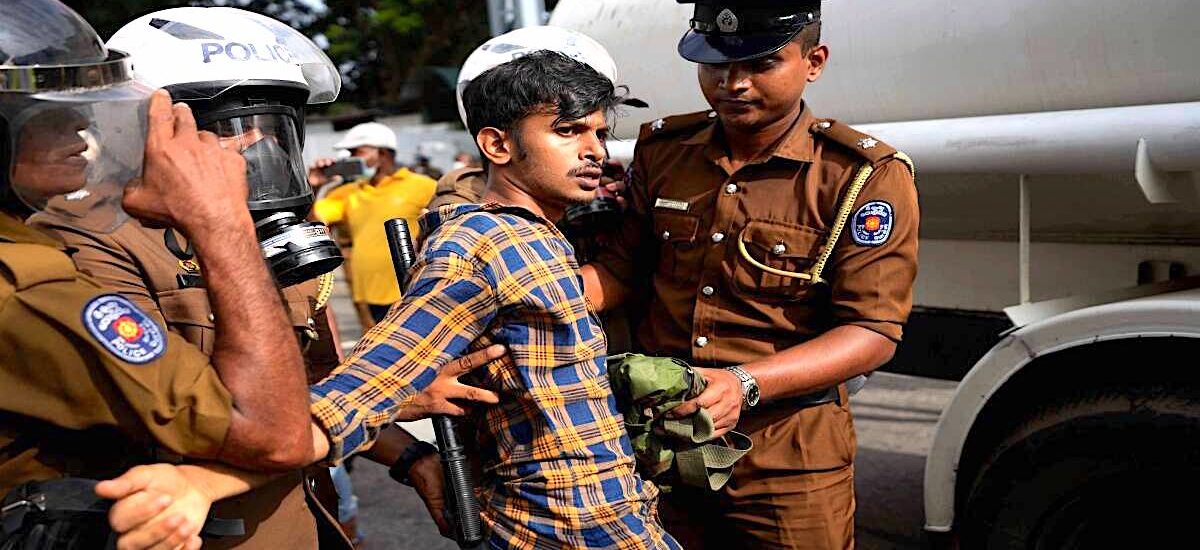Photo courtesy of The Indian Express
For several months, hundreds of anti-government protesters have been arrested for mass gatherings, three of them under the Prevention of Terrorism Act. On October 9, at Galle Face, a teenager was arrested and later released while children were assaulted and intimidated as police beat protestors with batons and dragged them along the ground.
Student leader Wasantha Mudalige has been arrested and detained for a 90 day period. In parliament opposition leader Sajith Premadasa asked prime minister Dinesh Gunawardena why Mudalige was being taken to various areas in the night and urged him to take the matter seriously.
The Bar Association of Sri Lanka and other civil society organizations are criticizing the arrests and demanding that PTA not be used against peaceful protestors. But, to increase the repression, the government has introduced a bill to create a new legal-institutional structure to rehabilitate protesters.
The Minister of Judicial Prison Affairs and Constitutional Reform Dr. Wijedasa Rajapakse presented the Rehabilitation Bureau Bill to the Cabinet on September 23. The government is planning to imprison protestors for years, especially the young people, under the guise of rehabilitation.
Detaining young people in rehabilitation camps is not a new experience for Sri Lanka; it happened in the north during the war and in the south during the JVP uprisings. In the 1980s thousands of young people in the south were imprisoned for years and youth leaders like Upatissa Gamanayake died in police custody. In the late 2000s, about 11,000 youths from refugee camps in Vavuniya were arrested and imprisoned in rehabilitation camps.
According to legal experts the 1978 Constitution, the Penal Code, the Criminal Procedure Code Act No. 15 and the Criminal Procedure Code Amendment Act No. 15 are sufficient to maintain peace. Laws such as the infamous PTA and the proposed Rehabilitation Bureau bill are intended to suppress dissent.
The proposed rehabilitation process is frightening because the camps will be run by the army, which keeps confidential records of detainees. Military personnel in the camps are empowered to maintain peace and discipline. They will be allowed to use minimum force to maintain peace and order. The act precludes civil or criminal charges against any military officer exercising the powers and functions of the Bureau. This means that the military officers in charge of the camps are given immunity, allowing the use of physical violence and torture against the detainees.
Anyone who obstructs officers of rehabilitation centres can be fined and imprisoned for six months. The detainees may be used as forced labour under is a provision that states that the abilities of those receiving treatment and rehabilitation can be used to improve the economy.
At a recent press conference, youth leader Vidarshana Kannangara pointed out that instead of rehabilitating politicians who stole public property, people who opposed the crime were being rehabilitated. One of the government’s youth leaders, Namal Rajapaksa, defended the bill. “Indeed, the strugglers brought the country down. We know who are the political brains here. Innocent youths who unknowingly served for the political needs of certain political parties and groups should be rehabilitated. Otherwise, this country will not be good. It will not be good for those innocent youths,” he said.
President Ranil Wickremesinghe has ordered the police to prevent children from being used as human shields during protests. President Wickremesinghe cited Article 27 of the Constitution, “The State shall promote with special care the interests of children and youth, so as to ensure their full development, physical, mental, moral, religious and social, and to protect them from exploitation and discrimination.” According to him, the serious offence was taking children to protests rather than the police hitting them.
Gotabaya Rajapaksa’s strategy to suppress public protests was to put up road barriers and President Wickremesinghe’s strategy is to tighten laws. If the existing laws are not sufficient, he will not hesitate to introduce new laws.
In 1940, the Nazi regime in Germany had similar repressive laws to suppress protest groups. In Italy, Benito Mussolini closed opposition newspapers and banned public protest meetings. He declared all political parties illegal except for his own party. He outlawed labour unions and strikes. He also established a political police force.
In Sri Lanka, there have been torture camps called Eliyakanda and Batalanda. Young people arrested by the police never came out of the camps alive. This is why there should be more citizens’ protest campaigns against forced arrests and prolonged detention.
People took to the streets earlier this year demanding basic necessities and protesting against high prices of essential items. They wanted a new political culture that was accountable to the people. They wanted politicians who would not steal people’s money. Instead, they received tear gas and water cannons. Now they are getting rehabilitation camps. Despite a temporary change of government, nothing has changed.
Either the government has to meet the demands of the people or else the police will have more work to do because people will start protesting again.
Petitions have been submitted to the Supreme Court against the Rehabilitation Bureau Bill and the Human Rights Commission is receiving complaints about the arrests being made under the PTA. Protesters continue to demand the release of their imprisoned colleagues. Without addressing the causes for the protests, there is no point in only having more laws.


